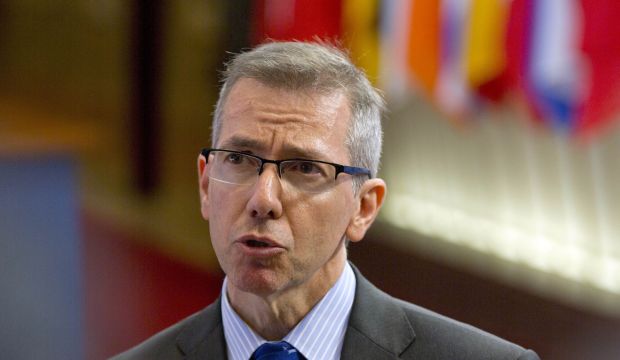
File photo of United Nations envoy Bernardino Leon taken in Brussels on Nov 9, 2014. (AP Photo/Virginia Mayo)
Tripoli, Reuters—Libya’s factions have agreed to a new round of UN-backed negotiations to attempt to end the conflict destabilizing the North African country three years after its civil war ousted Muammar Gaddafi.
The meeting, announced after United Nations envoy Bernardino Leon met rival parties in Libya, will take place next week in Geneva, the UN mission said in a statement on Saturday.
Libya, which is a major oil producer, has slipped deeper into division since the overthrow of Gaddafi, with two rival governments and two parliaments, each backed by competing groups of heavily armed former rebel fighters.
“In order to create a conducive environment for the dialogue, Special Representative Leon has proposed to the parties to the conflict a freeze in military operations for a few days,” the UN said.
The statement did not make clear who would attend the talks or give an exact date. But it said the meeting would seek to address the formation of a unity government, drafting a new constitution and ending of hostilities.
Negotiators have struggled to bring the two sides to the table during months of consultations. Fighting has also complicated attempts to broker talks.
“This represents a last chance which must be seized. Libya is at a crucial juncture; the different actors should be in no doubt of the gravity of the situation that the country finds itself in,” European Union’s foreign policy chief Federica Mogherini said in a statement backing the talks.
After weeks of fighting in the summer, an armed faction, Libya Dawn, allied to the western city of Misrata, took over Tripoli, driving out fighters from the city of Zintan who had set up in the capital after the fall of Gaddafi.
Libya’s internationally recognized government of Prime Minister Abdullah Al-Thani and the elected parliament now operate out of the east. Most countries pulled their diplomats out of Tripoli after the city fell to Libya Dawn forces.
Each faction claims the mantle of true liberators of Libya, each brands its fighters the real army and each seeks international recognition in a conflict that Western powers and African neighbors worry will fracture Libya.
